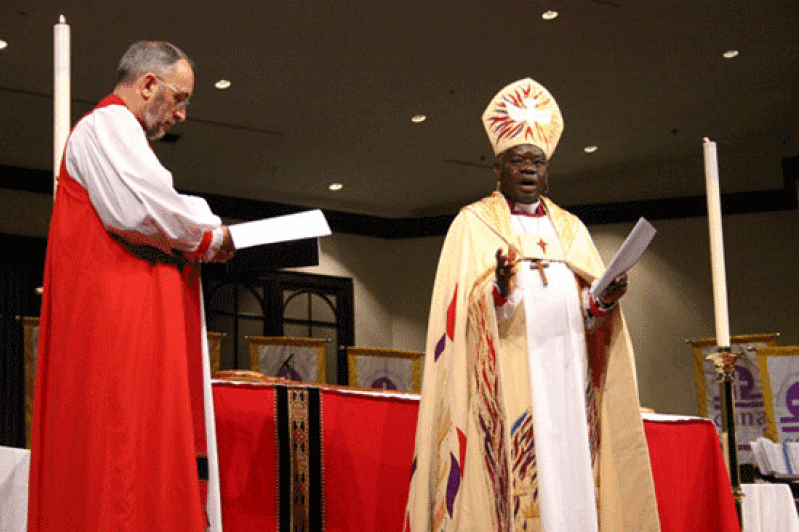
Nigerian Anglican leader Archbishop Peter J. Akinola told the head of Anglican churches worldwide that they are a deeply divided communion and despite many efforts to keep the body from splitting, the division has only deepened.
"As leaders of the [Anglican] Communion, we have all spent enormous amounts of time, traveled huge distances, sometimes at great risk, and expended much needed financial resources in endless meetings, communiqus and reports," wrote Akinola in a letter addressed to Archbishop of Canterbury Rowan Williams.
“We have developed numerous proposals, established various task forces and yet the division has only deepened,” he added.
The letter, published on May 6, was written in response to Williams who had asked Akinola to cancel plans to install a local minister in northern Virginia as head of the Convocation of Anglicans in North America – a conservative splinter group and missionary arm of the Church of Nigeria.
Although the letter was publicized just days before the installation of the Rt. Rev. Martyn Minns as missionary bishop of CANA on Saturday, Akinola said that he did not receive it until after the ceremony.
Still, the Nigerian Anglican leader – who was recently featured as one of Time magazine's top 100 Most Influential People in the World – said he wanted to respond and clarify the situation with regard to CANA.
CANA was established as "a way for Nigerian congregations and other alienated Anglicans in North America to stay in the Communion," he wrote.
It does not bring any advantage to the Church of Nigeria financially or politically, the conservative leader added, but he said, "We believe that we have no other choice if we are to remain faithful to the gospel mandate."
At the heart of the crisis in the Anglican Communion are the "decisions, actions, defiance and continuing intransigence of the Episcopal Church," Akinola pointed out. Controversy within the Communion heightened when the Episcopal Church consecrated an openly gay bishop in 2003. Conservative Anglicans leaving the American church body argued the Episcopal Church's departure from Christian orthodoxy was the reason for their split.
Akinola told CANA members on Saturday during the ceremony that the conservative group was there to provide a "spiritual home" for God's people. Minns said CANA was for those who want to remain "faithful members of the Anglican Communion" but cannot do so in "good conscience" in the Episcopal Church.
Such interventions as the Church of Nigeria's missionary initiative in the United States were said to have exacerbated the fragile situation in the Anglican Communion, stated a February communiqu drafted by the Primates (Anglican leaders). But the communiqu also recognized that those Primates who have intervened do not feel it is right to end those interventions until it becomes clear that sufficient provision has been made for the life of those persons and until there is change in the Episcopal Church.
Akinola assured Williams that CANA was established "for the Communion" and that they have no desire to cling to it.
"We are more than happy to surrender it (CANA) to the Communion once the conditions that prompted our division have been overturned," he wrote. He had made that pledge in February during the Primates meeting and also to CANA members on Saturday.
While the Church of Nigeria tried delaying the election of their first CANA bishop and the election of additional suffragan bishops for the conservative U.S. group, Akinola said the Episcopal Church has not embraced the Primates' recommendations that the U.S. Anglican arm not authorize same-sex blessings and confirm another openly gay bishop.
"They are determined to pursue their own unbiblical agenda and exacerbate our current divisions," Akinola stated.
The Episcopal House of Bishops recently passed resolutions affirming gays and lesbians as "full and equal participants" in the church and rejecting the Primates' plan for leaders outside the U.S. Anglican body to oversee the conservative American dioceses that disagree with the Episcopal Church.
Episcopal Presiding Bishop Katharine Jefferts Schori also recently told The Boston Globe that the Episcopal Church will not likely be moving "backward" on their 2003 decision to elect Bishop V. Gene Robinson, a gay man living in same-sex relationship. She called the 2003 consecration "a great blessing."
"It is imperative that we continue to protect those at most risk while we seek a way forward that will offer hope for the future of our beleaguered Communion," wrote Akinola. "It is to this vision that we in the Church of Nigeria and CANA remain committed."







